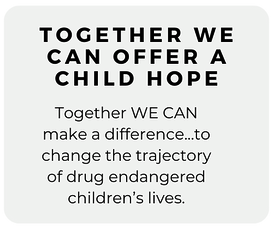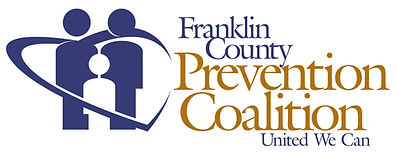OUR VISION
100% healthy, safe children, families and communities free from the negative impact
of substance misuse and drug activity.

Drug Endangered Children
.png)
What is a Drug Exposed Child?
A drug exposed child is one whose brain and/or body has been affected because his/her parents used drugs or alcohol during pregnancy, and/or who is living in a home where drugs are abused and/or are illegally made, sold, traded, or given away.
FACTS
-
Substance abuse contributes to 75% of incidents of child abuse and neglect of children in foster care
-
Nearly 80% of children in foster care have prenatal exposure to maternal substance abuse
-
80% of the children in foster care have at least one long-term health problem
-
25% of children in foster care have 3 or more long-term health problems, which is 3 to 7 times greater than the number of health problems found among other children living in poverty
HOW CAN YOU HELP?
Children found in drug endangered environments are at greater risk for physical, emotional and developmental harm. These children may experience severe neglect, physical or sexual abuse, may suffer from respiratory conditions and may be malnourished and experience developmental delays. A drug endangered children (DEC) program will help rescue, defend, shelter and support at risk children in your community from these devastating effects.
Which professionals can look for signs and evidence of risks to children?
Every professional who comes in contact with children and/or parents/caretakers has the opportunity to identify risks to children. This would include the obvious: child welfare, law enforcement, medical, teachers OR educators, prevention and treatment professionals, and fire/ems. But it can also include the not so obvious: code enforcement, camp counselors, housing authorities, utility workers, nurse-family partnerships, and others.
Why is it critical that professionals understand and identify risks to children?
To be able to report to appropriate agencies (i.e. Child Welfare, Law Enforcement)
-
To allow for earlier identification, intervention, and services for drug endangered children
-
To increase information and evidence for other professionals in order to help drug endangered children
-
To enhance investigations and cases of all disciplines
-
To enhance the capacity of each agency to better serve children
-
To increase the likelihood of breaking the multigenerational cycles of abuse and neglect and substance abuse
What can professionals look for?
-
Signs of children
-
Indicators of increased risk of abuse or neglect
-
Signs of physical, emotional, sexual abuse
-
Signs of actual neglect
DEC Approach:
No single entity can effectively or efficiently address the Drug Endangered children dilemma. Our goal is to collaboratively combine the expertise and resources of multiple professionals, agencies and communities to improve interventions for children and their families.
-
By collaborating, we increase the likelihood of success for the good of children and families.
-
By collaborating, it will make you or your organization a part of the larger solution.
-
By collaborating, you will be connected to other professionals working on the same challenges.
-
By collaborating, it will help you advocate more effectively on behalf of children and families in the state of Tennessee
The Tennessee Alliance for Drug Endangered Children approach is a comprehensive approach that focuses on the formation of community-based partnerships to engage professionals from multiple disciplines in developing a collaborative approach to rescue, defend, shelter and support children living in drug environments. Our goal is to implement a systematic change across the state. The change will be a new proactive approach for addressing the needs of our children to prevent exposure to human trafficking and the dangerous drug epidemic.

.png)
.png)

Felicia Kelsey
Family & Children's Services Coordinator
Phone: (931) 308-4484
felicia.kelsey@fcstn.net

This project is funded under a Grant Contract with the State of Tennessee
.jpg)